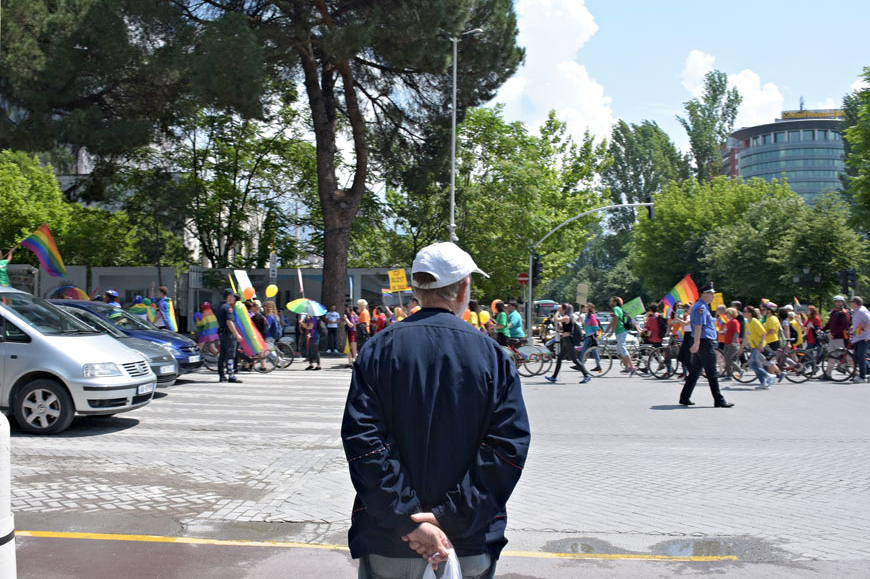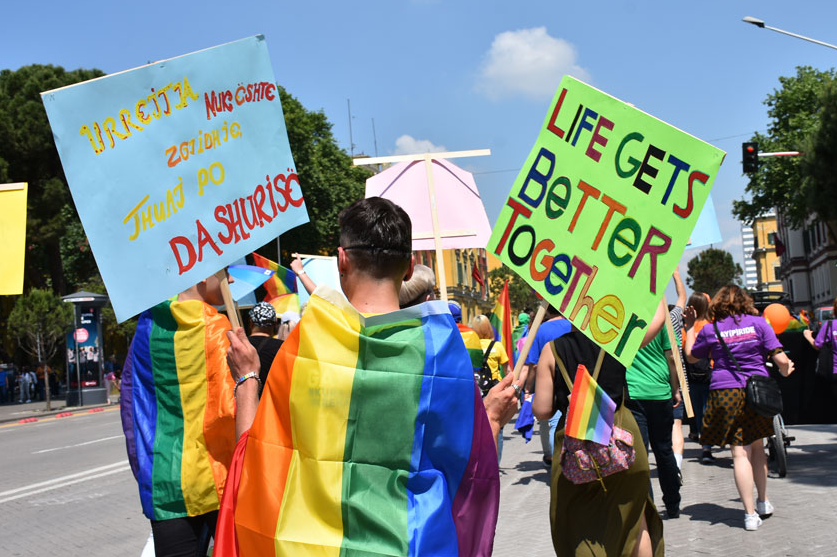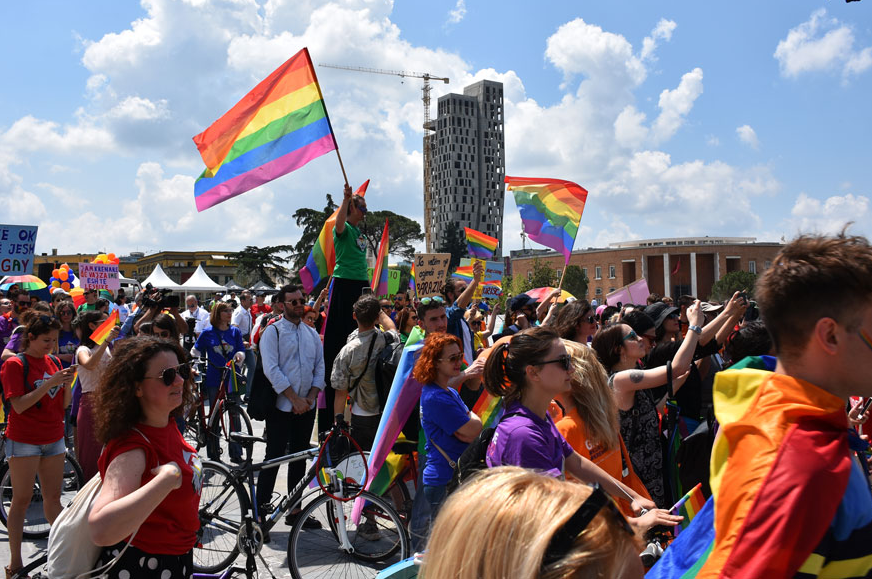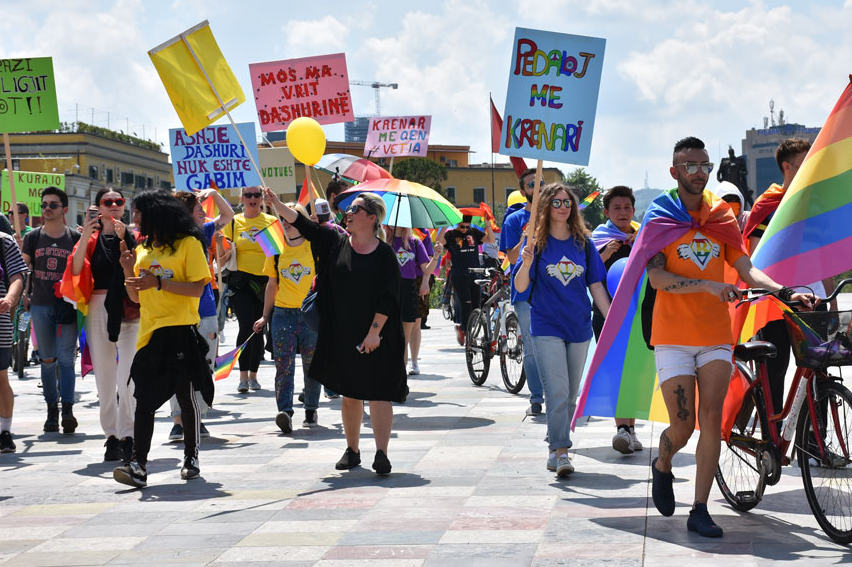May 13, 2018, lunchtime
“Freedom! That’s what we’re talking about!” a deep but friendly voice says to me, after allies and activists from the LGBT+ community finish their speeches at Skanderbeg square in Tirana.
Right after, singer Bojken Lako comes on stage alongside other artists who have chosen not only to publicly support the community, but also to contribute through a motivational concert that unites people through music, regardless of their gender identities, sexual orientations, ethnicities, religious views, etc.
This joyful atmosphere, reminds us that in our attempt for social equality and justice, the celebration of freedom will always have its deserved place; making sure in the meantime, to increase the connections between the supporters, who are meeting each other here for the first time.
The man who spoke to me seems to belong to a mature generation. His grey hair and genteel smile catch all of my attention. On that sunny morning, it seems that he ended up in the city center completely by chance, where he then stumbled upon the youth group and the community itself.
In a violent and homophobic society such as the one in Albania, the first instinct towards an outsider who chooses to take part in the parade is doubt, then defensiveness. Without a bridge of communication having been built between the two parties, it is likely for the conversation to start with dismay and a distrusting glance — or even a rather potent, suspicious stare — towards the other, who happens to be someone like the man I ran into (who curiously and consciously decided to join the protest). In the world outside the parade, the other could be a transgender or homosexual person in a deeply heteronormative environment.
“I can’t believe we’re finally talking about this!” the gentleman breaks the silence joyfully. “It’s about freedom! There is nothing more holy than freedom and human dignity!”
Excited and with that typical astonishment that good events can cause, he continues talking to me. I, on the other hand, have been left speechless. While the man is in disbelief that Albania is now taking the right path towards social and cultural development, I still can’t believe that this development is finally being supported by a social strata that only a few years ago conjured feelings of insecurity over whether at some point, somebody might exercise violence or something unpleasant would happen during the march.
At least, I like to think that the man’s attitude confirms exactly this positive feedback, as much as the wedding convoy that stopped beside the marchers, cheering us on while honking their horns.
In seven years of protests, manifestations, meetings, debates, writings and every kind of democratic form of expression and opposition, this year’s parade, and especially the participation and reaction from the citizens in Tirana’s streets, implied that the chance of integrating the LGBT+ community in all social spheres in Albania, could happen much faster and be more successful than we have believed until now.
I don’t know if hard work and willpower are sufficient to achieve change, but I know that this is a good starting point.
That day, a couple of hours earlier
Lola, a young representative and activist woman of the transgender community in Albania, with respectful courage, addresses from the small podium the diverse crowd of students, activists, ambassadors, politicians, parents and their infants, grandparents, and a few curious Roma children, who wait impatiently to listen to what she has to say.
“As a young trans girl who was forced to quit school because of systematic violence, being here today in front of you means a lot to me, not only for giving a voice to the problem of bullying against LGBT+ people in schools, but also for bringing to attention all the trans people of Albania.
We exist! We have always existed and we will continue to exist!
We enjoy equal rights as all the citizens of the Republic of Albania and we don’t accept having these rights denied to us! This is why we will not hide and we will not keep silent anymore, until these rights and freedom are ensured to us for real!
I want to be the last girl from Albania’s trans community who quits school because of violence. I love knowledge! I love life and freedom! And I don’t ask for anything more than my place in our society!”
Lola is not afraid. Or better yet, she is no longer afraid, as she has chosen to challenge the hitherto reality and take matters into her own hands. But above all, because there can’t be a place for fear in the society we want to belong to.
Lola speaks loudly and powerfully and her words are a proof of hope and encouragement, not only for the girls and women of the trans community in Albania, but for all of us who were born into such a patriarchal society and have never accepted it.
Lola’s own public existence is a manifestation of revolt and a call for action. And she succeeds, as a very capable and courageous woman that she is, while leaving the microphone to her closest ally in this fight, Serafina, another young transgender woman and activist of the community.
Lola and Serafina are not only united by their gender identity under the patriarchal hoof, but also by their common experience of quitting school because of our society’s and government’s failure to transform this institution into a safe shelter that welcomes gender and sexual diversity, and translates it into the most valuable capital of a democratic and free society.
Serafina left school but not the courage to educate us on human dignity:
“I didn’t want to quit high school! I wanted to continue it normally as all my friends did. Afterwards, I wanted to go to college, choose a field where I could contribute and become someone WITHOUT HIDING MY IDENTITY AS A WOMAN! I am a woman and proud of this fact! And I do not want to be denied the rights that I have as a woman and a transgender person, just because others might wish for me to have another gender identity.
So I chose to become a trans rights activist and fight for my freedom and the freedom of all the people who are like me. Today I protest to resonate love and tolerance. But love and tolerance won’t come to life without cooperation. I am not here to compromise your identity, but simply to ask that you do not compromise mine!
People are different, they feel different and love differently! We shouldn’t be troubled by this fact. We should be troubled by hatred and the absence of love.
I want to live in a society in which there is no place for hate and where everyone respects one another, because the world belongs to all of us, and I believe that together we can achieve a more tolerant and just society!”
Schools must be open for all, they’re the ground of radical social change, of the change of unjust policies and dead mentality. By now, the LGBT+ community and its allies have materialized this awareness over the importance of education, that’s why the main banner of the protest decried bullying in schools.
We cannot speak about the type of education that schools transmit to future generations if equal opportunities for access to this education are not guaranteed. How can we speak of inclusion when some of us cannot sit in classrooms, as the most privileged among the underprivileged?
Every young boy or girl quitting education is an alarm bell for all of us, especially when this decision is taken under survival conditions, because physical security is not provided for some of the citizens of the Republic of Albania, precisely right there where tolerance, respect and the most basic human values should have been sowed — in schools.
This alarming situation is however not an Albanian phenomenon, despite the form it has taken in this space. Violence is a human phenomenon, just as much as the choice to deny it. There are many LGBT+ people in the Balkans who just like Serafina and Lola, are forced, if not to quit school, then to leave their jobs or families due to aggressive pressure.
Therefore if there’s at least one merit of the Pride parade, besides giving a deserved public space to LGBT+ people, it’s shattering the nationalistic wall and allowing Albanians, Serbs, Kosovars, Bosnians, Macedonians and Greeks to walk together hand in hand. The parade is above all an awareness of the fact that before identifying ourselves with the relevant nationalities, we are people inside a common reality, where the only difference is our relationship to the power — all kinds of power, in our respective states.
The enemy of a Serb and an Albanian or a Serb and a Bosnian, or a Macedonian and a Greek, are not each-other but the divisive and oppressive politics of divisive and oppressive governments that we can take down, change or bring to the right path only without breaking this healthy connection that has taken place in the streets.
The future is female
“I am a girl and I like girls! I’ve always liked them! I want to go out with my girlfriend, just like you. I want to walk hand-in-hand with her, kiss and hug her in the streets, in bars, at the theatre or cinema; tell her that I love her, loudly, without fearing that someone will spit on me, swear at me, or punch me because of this.
Love does not produce fear, nor violence. Ignorance and the lack of communication produce violence and isolation…
You may have never met a homosexual during all your lifetime but here I am! Ask me anything you don’t understand! I promise I’ll answer to every question of yours.
Do not violate my love, do not violate my freedom to love and live; do not violate my right to work, do not violate my life, just as I do not violate you! Do not push me aside, but give me a hand if no-one else does. Together we can change our society, make it less violent and more open and friendly. Our society belongs to me, just as much as it belongs to you!”
Kejda Jahja is speaking as a representative and activist for the rights of lesbian girls and women. She is educated, but her education, experience and skills within her professional and academic field apparently, are not sufficient for her to keep a job for a long period of time, because in this environment, she is doubly discriminated because of her sexual orientation (lesbian) and her gender identity (woman).
This young woman, who may usually attract attention because of her introverted behavior, cycles in the front of the protest holding a rainbow flag up high. She is there to show that the right to work is a basic human right from which we aren’t going to allow the lesbian girls and women and also gay boys and men, to be excluded.
Kejda’s words highlight the lesbian community in Albania, as well as the oppression that is generally inflicted upon women in this country. These words serve as a warning for the intensified attempts to come for the further inclusion and fair treatment of all women.
Shame and dignity (morning, before the start of the parade)
What does it mean to be an LGBT+ ally? In a daubed notebook full of writings, sitting on the sidewalk of the main boulevard of Tirana, I try to correctly and concisely answer this question, so that I can shout it loudly a few hours later, before everybody who’s going to be present in the protest.
It’s too early. My friend and colleague, Xheni Karaj, an emblematic figure of the LGBT+ movement in Albania, managed to wake me up in time — her time, to be precise.
“An activist should be on scene more than three hours before the start of the event, actually even earlier than that,” notes Xheni, worried if everything will go according to the plan and hoping that this year we will succeed better than last year.
I sharpen my pencil and start to write, but suddenly, a woman approaches me in a threatening manner while yelling: “Aren’t you ashamed? You filthy people! You are destroying this country!” I remember that I haven’t had my coffee yet and I let the woman know of this irrelevant information, while I try to explain to her that love isn’t ugly, nor shameful.
Such are the insults and the violence used against someone minding their own business. If this country has been destroyed by anything, it’s the everyday systemic and patriarchal violence. She refuses to listen to me some more, and leaves without stopping cursing me and my friends.
We still have so much work to do: this is just the beginning! That is why it is important to unite with the LGBT+ community even if one isn’t homosexual or bisexual, or if one doesn’t identify with a gender different from the sex in which they were born.
We must understand that the only assurance of our own safety and welfare is the equal guaranteed safety and welfare of the other, and that if he or she is violated in their most basic rights, there’s a risk that the same thing will happen to you and me sooner or later.
There can’t be harmony in societies that are fundamentally divided and aggressive. A good and just society is a society that allows all its members to live together in peace, despite how different they may be. Social justice serves everybody, not only a few. It is the most noble thing human beings have been able to create to improve their lives.
We have an urgent need to make a place for love and tolerance among us. Moreover, the violence towards us as citizens, despite our sexual orientation, political ideas, religious faith or ethnicity is firstly exercised by this oppressive system.
The advocacy campaign for the LGBT+ rights is a step forward in our common social effort, against all faces of oppression. The LGBT+ issue is an issue for the whole society, not only an issue of the community itself.K
Feature image: Loreta Cuka.






